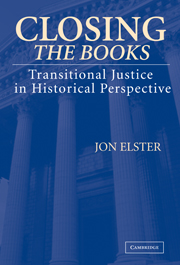4 - The Structure of Transitional Justice
Published online by Cambridge University Press: 17 November 2009
Summary
INTRODUCTION
To compare and explain cases of transitional justice, we must first define the comparanda and explananda. This is the purpose of the present chapter. The most difficult task is to spell out the role of “justice” in transitional justice. In Section II I consider justice as a motivation – the desire for justice to be done – and its complex relations to other motivations that may animate the actors in this context. The topic of Section III is justice as an institution. The main challenge here is to identify criteria that allow us to distinguish legal justice – the main topic of the present book – from political justice. In Section IV I distinguish among levels of transitional justice, which may involve – as executors or targets – individuals, corporate actors, states, or supranational entities. In Section V I discuss categories of agents involved in transitional justice, focusing on cases in which one person belongs, simultaneously or successively, to more than one category. In Section VI, finally, I try to identify the key decisions of transitional justice that have to be made by the incoming leaders. These decisions will reappear as the dependent variables in the last three chapters.
THE MOTIVATION OF JUSTICE
The main task of this book is to discuss why processes of transitional justice have taken different forms in different transitions, and why they have sometimes been absent altogether. This is a positive or explanatory task.
Information
- Type
- Chapter
- Information
- Closing the BooksTransitional Justice in Historical Perspective, pp. 79 - 135Publisher: Cambridge University PressPrint publication year: 2004
Accessibility standard: Unknown
- 2
- Cited by
